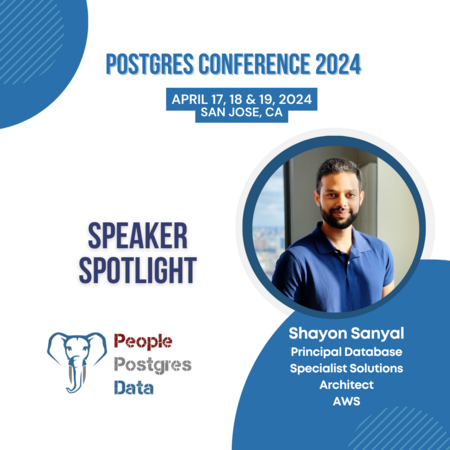 As part of the countdown to Postgres Conference 2024, learn more about the engaging content and our speakers for this year in our Speaker Spotlight Series.
As part of the countdown to Postgres Conference 2024, learn more about the engaging content and our speakers for this year in our Speaker Spotlight Series.
Shayon Sanyal is a Principal PostgreSQL Specialist at Amazon Aurora, with over 15 years experience, and crafts resilient applications, leveraging PostgreSQL's advanced features.
Shayon will present Enhancing OLTP Systems with pgvector: Best Practices in Database Design. Read what Shayon has to say about Postgres and why to attend their session:
Why should attendees come to your talk at Postgres Conference 2024? What would you like for them to take away from your session?
The integration of pgvector into existing Online Transaction Processing (OLTP) systems represents a significant advancement in leveraging vector search capabilities within traditional database environments. This presentation is designed to educate database professionals on the thoughtful integration of pgvector into OLTP applications powered by PostgreSQL, ensuring enhanced functionalities without compromising the core transactional integrity and performance. Attendees will learn how to adopt pgvector to unlock new application features while maintaining reliability, performance and scalability of their PostgreSQL databases. The presentation provides a roadmap for practical pgvector integration regardless of the hosting environment.
What is your favorite aspect of Postgres Conference?
For me, the most amazing aspect of the Postgres Conference is the opportunity to learn from and engage with some of the most brilliant minds in the PostgreSQL ecosystem. The lineup of speakers and contributors is always exceptional, offering invaluable insights and perspectives that can shape the future of this powerful database management system. The depth and breadth of technical discussions from advanced database internals and performance optimizations to cutting-edge features and real-world use cases, the conference provides a platform for exploring the full potential of PostgreSQL. It's a true feast for those who crave technical excellence.
What advice would you have for a Computer Science graduate or entry level developer who are interested in learning and engaging with Postgres and other open source technologies?
My advice would be to dive in headfirst and immerse yourself in the open source community. Start by exploring the official documentation and resources provided by the PostgreSQL project. Don't be afraid to ask questions on forums, mailing lists, or community channels – you'll be amazed at how welcoming and supportive the community is, especially towards those eager to learn. Attend local meetups or online events focused on PostgreSQL and open source technologies. These are excellent platforms for networking, learning from experienced professionals, and staying up-to-date with the latest trends and best practices.
How do you see the use of open source technologies evolving over the next five years?
Increased adoption across industries: Open source technologies have already gained widespread acceptance in the tech industry, but I expect their adoption to accelerate across various other sectors, such as finance, healthcare, manufacturing, and government. As organizations recognize the benefits of open source, including cost-effectiveness, flexibility, and community-driven innovation, they will be more inclined to embrace these technologies in their mission-critical systems.
What considerations should be taken for the adoption and use of Postgres and related open source technologies?
If I had to pick 2 then - 1/ Community Support and Documentation: Evaluate the size and activity level of the community surrounding the open source project. A vibrant and engaged community is often a good indicator of the project's long-term sustainability and the availability of support resources, such as documentation, forums, and mailing lists. and 2/ Scalability and Performance: Thoroughly assess the scalability and performance capabilities of the open source technologies you intend to use, especially if you anticipate handling large volumes of data or high-traffic workloads. Conduct performance testing and benchmarking to ensure that the technologies meet your specific requirements. Then there are other considerations such as security and compliance, integration and interoperability etc.
Check out the full schedule for PostgresConf US 2024. Learn more about our conference here and buy your tickets soon!